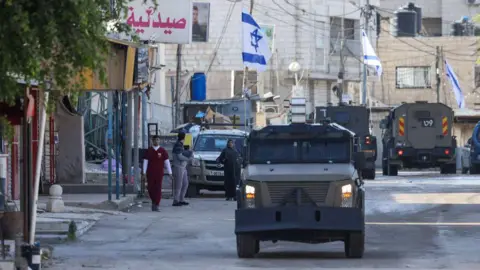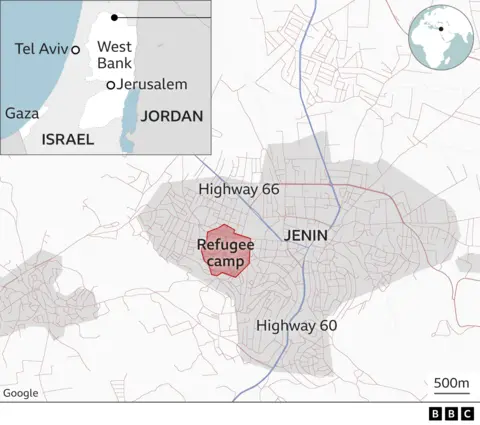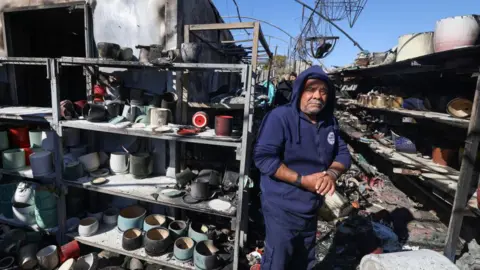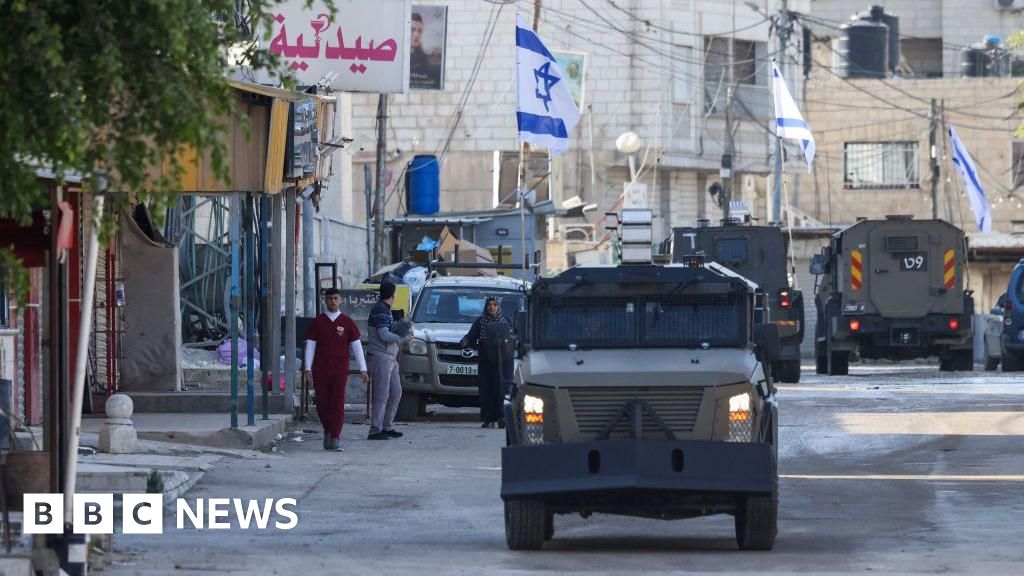 AFP
AFPNine Palestinians have been killed and 35 wounded by Israeli forces during a major operation in Jenin in the occupied West Bank, the Palestinian Ministry of Health said.
Palestinian media reported that there were a series of airstrikes as large numbers of troops moved into the city and its refugee camp, backed by drones, helicopters and armored bulldozers.
Israel’s prime minister said it was launching a “comprehensive and significant” operation to “fight terrorism” in Jenin, long seen as a stronghold of Palestinian armed groups.
It comes three days after the start of a cease-fire in Gaza and highlights the threat of more violence in the West Bank, where suspected Israeli settlers also went on the rampage overnight.

Jenin’s governor, Kamal Abu al-Rub, told the AFP news agency that “what is happening is an invasion of the camp”, adding: “It came quickly, Apache [helicopters] in the sky and Israeli military vehicles everywhere.”
The official Palestinian news agency, Wafa, quoted local sources as saying that Israeli forces “completely besieged” the Jenin camp and that armored bulldozers had dug up several streets.
It also quoted the director of Jenin’s government hospital, Wissam Bakr, as saying that three doctors and two nurses were among those wounded by Israeli gunfire.
Palestinian security personnel reportedly withdrew from some of their positions around the Jenin refugee camp before Israeli forces moved in on Tuesday morning.
Brig-General Anwar Rajab, a spokesman for the Palestinian security forces, told AFP that Israeli forces had “opened fire on civilians and security forces”, resulting in a number of injuries.
On Tuesday evening, the Palestinian Ministry of Health reported that eight men and a 16-year-old boy, whom it named as Mutaz Abu Tbeikh, had been killed by Israeli forces in Jenin.
Another man was shot dead by Israeli troops in the village of Tianik, about 8 km (5 miles) to the northwest, it added.
A statement from Israeli Prime Minister Benjamin Netanyahu said the Jenin operation – dubbed the “Iron Wall” – was a “further step in achieving the goal we have set: to strengthen security” in the West Bank.
“We act methodically and decisively against the Iranian axis wherever it reaches: in Gaza, Lebanon, Syria, Yemen and [the West Bank] – and we are still active.”
Israel accuses Iran of smuggling weapons and funds to Hamas, Palestinian Islamic Jihad and other armed groups in the West Bank to foment unrest.
Israeli media quoted a military source as saying the goals of the operation were to maintain its “freedom of action” in the West Bank, dismantle armed groups’ infrastructure and eliminate imminent threats. The source also said the operation would continue “as long as necessary”.
Palestinian Authority Prime Minister Mohammed Mustafa condemned the raid, saying it was the latest in a series of “aggressive Israeli measures” against Palestinians in the West Bank, according to Wafa.
Hamas and Palestinian Islamic Jihad both called on Palestinians in the West Bank to escalate attacks against Israel in response to the Jenin operation.
There have been a number of previous Israeli military operations in Jenin.
And recently, PA security forces conducted a controversial, weeks-long operation against armed groups there, including Hamas and the PIJ, in an attempt to reassert their control.
There has been an increase in violence in the West Bank since Hamas’s deadly attack on Israel on October 7, 2023 and the subsequent war in Gaza.
Hundreds of Palestinians have been killed as Israeli forces have stepped up their raids, saying they are trying to stem deadly Palestinian attacks on Israelis in the West Bank and Israel.
 AFP
AFPIn another development in the West Bank overnight, dozens of masked Israeli extremists attacked Palestinians in two villages east of Qalqilya, Jinsafut and al-Funduq, setting fire to Palestinian homes and cars and smashing property.
At least 21 Palestinians were injured, according to the Palestinian Red Crescent. Two Israelis were also shot, apparently when an Israeli police officer opened fire while responding to the violence.
“If you were there last night, you would hear nothing but the screams of women and children,” said Mohammed, whose family home in al-Funduq was meters away from a garden center that was set on fire.
“At the end of the day, we have nothing to protect ourselves. But they have everything to attack us.”
The Israeli military said it was investigating the incidents, during which it said Israeli civilians “incited riots, set fire to property and caused damage”. It also said they threw stones and attacked Israeli security forces.
It happened just as the new US president, Donald Trump, announced that he was lifting sanctions against Israeli settlers accused of carrying out attacks in the West Bank.
The reversal of the Biden administration’s sanctions targeting radical Israelis could indicate the direction of the new White House, which is expected to be more tolerant of Jewish settlement expansion.
Far-right, pro-settler Israeli Finance Minister Bezalel Smotrich welcomed the US move. In a post on X, he praised Trump’s “unwavering and uncompromising support for the state of Israel.”
Meanwhile, Palestinian officials condemned the change in policy. “Lifting sanctions against extremist settlers encourages them to commit more crimes against our people,” the Palestinian Foreign Ministry said in a statement.
The mayor of al-Funduq, Luay Tayyam, told the BBC: “It’s like a green light for the settlers, saying, ‘Just go ahead, do whatever you want. You won’t be persecuted’.”
“So they’re happy with this news. And I think it was a big boost for them last night. They feel encouraged by that.”
Tensions are also rising over the large-scale release of Palestinian prisoners in the West Bank this week, as part of the Gaza ceasefire and hostage release deal between Israel and Hamas.
The attack in al-Funduq was in an area where three Israelis were killed in a shooting earlier this month. It was the latest in a long series of settler attacks that have accelerated significantly since the start of the Gaza war.
According to the Israeli anti-settlement group, Peace Now, in 2024 settlers also established 59 new outposts without permission from the Israeli government. It was more than a doubling compared to the previous year – which was also a record year for the establishment of settlement outposts.
Israel has built around 160 settlements housing around 700,000 Jews since it occupied the West Bank in the 1967 Middle East war. The settlements are considered illegal under international law, although Israel disputes this – as did the previous Trump administration.

